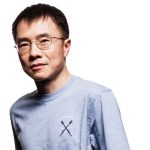STEVE Chen, co-founder of YouTube, still works 80 to 100 hours a week and prefers to think of himself as a Silicon Valley engineer rather than an investor or even corporate boss, despite having amassed a fortune of more than US$400 million.
Chen, 35, joined Google after selling YouTube to the popular search engine for US$1.65 billion in 2006. Then, he founded a new start-up firm called AVOS Systems in 2011, with a new video product released in China last month. Chen is also one of the investors in Innovations Works, an incubator for start-ups based in Beijing.
"If I am lost in a forest with two roads in front of me, I will definitely choose the one without tire marks," said Chen. "Uncertainty and challenge refresh and excite me."
Innovations founder Lee Kaifu says Chen is always following his heart, is crazy about new technologies and trends, and has entrepreneurship in his blood.
Hankered for more
"People, especially young entrepreneurs, can learn a lot from him," said Lee, who was also head of Google China and founder of Microsoft Research Asia.
After staying with Google for several years, Chen and Chad Hurley, another YouTube co-founder, started AVOS in 2011. Google was a comfortable place to work, with high pay, Chen said, but he hankered for something more.
On the AVOS platform, 40 percent of codes for new products are shared, which greatly saves time in programming. The products are globally developed on the platform in three places: San Mateo, California, Beijing and the New Zealand city of Dunedin.
Compared with detailed products like Delicious, purchased from Yahoo, and Playshot or Wanpai, launched in China last month, the code-sharing platform is more meaningful to programmers and the industry in the future, Chen said.
Wanpai is not a video platform, but rather a tool for people to easily capture and share video moments through mobile devices. The length of video is often only seconds on Wanpai, compared with the 20 or 30-minute video clips on YouTube.
Wanpai encourages users to share moments in daily life, including shopping, eating out and going to the movies. It integrates domestic social platforms such as Sina Weibo and Tencent Weixin in China, where YouTube and Facebook are not available.
China is a huge and rapidly growing market for both mobile and social services, such as Wanpai, Chen added.
Born in Taiwan, Chen's family moved to the United States when he was only eight. Chen says he identifies with Shanghai because relatives on his grandfather's side once lived in the city.
Barbecue party
That was one reason, he said, why he urged the start of Paypal China's business on eBay in 2004 and established a major research center on the Chinese mainland.
In February 2005, Chen and his co-workers Hurley and Jawed Karim of eBay founded YouTube. The idea for the website came during a barbecue party in Silicon Valley, after which participants found it difficult to share their videos of the event online.
"People needed a platform to upload and watch videos, free and without complicated technology requirements," said Chen. "YouTube also provides a path of discovery for musicians, actors, sportsmen and other people who want to display their talent."
Chen said he worked 100 hours a week on developing YouTube, upgrading website infrastructure, setting up servers and improving the user interface.
YouTube triumphed over rival services provided by giants such as Google and Yahoo in 2005 and 2006. Finally, it agreed to be acquired by Google in 2006.
Chen said he has never regretted the deal, though many people thought YouTube would be more valuable if it operated independently, according to his autobiography "Earning 13 billion yuan in 20 months."
"Different people have different strengths in different stages," Chen said. "It's suitable for me to create new and innovative products and technologies."
Perfect choice
With its experience in advertising and making money from websites, Google was a perfect choice to better manage YouTube and help it expand internationally, he said.
"Seven years after the acquisition, I think the DNA of YouTube hasn't changed," he added.
Chen said he thinks the next big developments in IT are cloud computing, individualized online services such as AVOS Delicious and Wanpai, and next-generation devices such as Google Glass.
Generally speaking, Apple's iOS system is better than Google's Android, but the gap has been narrowing recently, said Chen, who uses an iPhone 5.
One of the questions Chen is most frequently asked is why he doesn't just stop working and enjoy his newfound wealth.
"If you think like that, you won't earn much money," Chen always replies.
It's his core philosophy: Undertake something unique and innovative and give it your best, then move on to the next new idea.
He said he quit university just shy of receiving a degree and joined Paypal because it was a "once in a lifetime" opportunity. In 2004, Chen was in charge of launching Paypal services on the Chinese mainland.
In 2007, while in an airport, Chen fell unconscious and awoke in a hospital to be told he had a brain tumor. After surgery, he said, his whole attitude changed.
"You are forced to try to understand the meaning of life when you are close to death," he said. "It made me think twice and reflect on my life."
In 2008, Chen married. Nowadays he is careful to set aside time for his family. He likes to watch favorites on YouTube - often animal and children's video clips - and play games to relax.
The future looks sweet, but Chen's not taking it for granted.









